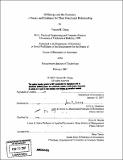Of energy and the economy : theory and evidence for their functional relationship
Author(s)
Chang, Vincent H. (Vincent Hua-Cheng)
DownloadFull printable version (5.364Mb)
Other Contributors
Massachusetts Institute of Technology. Dept. of Economics.
Advisor
Jerry A. Hausman and Ernst R. Berndt.
Terms of use
Metadata
Show full item recordAbstract
This paper offers a set of explicit functional relationships that link energy and the economy. Despite the reliance on energy permeating the whole economy, no such complete relationships had been presented before. How related are energy and the economy? What role does energy play in the economic growth? Motivated to seek an explicit functional answer, I theorize the role of energy and then test it with economic models, using data for 16 OECD countries from 1980 to 2001. First, I find that energy is a cross-country representative good whose prices are equalized when converted to a reference currency. Thus, energy prices satisfy the purchasing power parity. For all but one country, the half life of the real energy exchange rate is less than a year and as low as six months, shorter than those derived by other real exchange rate measures. Second, considering energy a cross-time representative good, I obtain that a country's utility function is inversely proportional to both its income share of energy and its energy price. I also obtain an explicit, unified two-dimensional (cross countries and time) production function with energy and non-energy as the two inputs. Third, I conclude a cross-country parity relationship for income shares of energy, similar to that for energy prices. (cont.) Further, I provide an intertemporal connection between the trajectory of the income share of energy and the productivity growth of the economy. Lastly, I demonstrate the tradeoffs between energy efficiency and economic wellbeing, with the energy price being the medium for the tradeoffs. One may apply the functional roles of energy offered in this paper to help frame the current global-scale issues that are energy relevant.
Description
Thesis (Ph. D.)--Massachusetts Institute of Technology, Dept. of Economics, 2007. Includes bibliographical references (p. 138-140).
Date issued
2007Department
Massachusetts Institute of Technology. Department of EconomicsPublisher
Massachusetts Institute of Technology
Keywords
Economics.